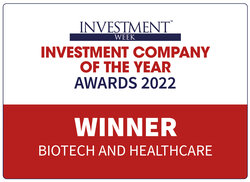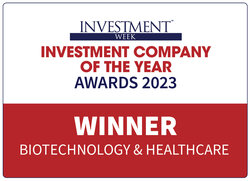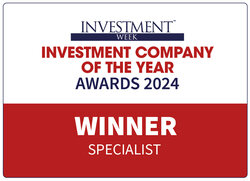Polar Capital Global Healthcare Trust plc (the "Company"): The Company is an investment company with investment trust status and its shares are excluded from the Financial Conduct Authority’s (“FCA”) restrictions on the promotion of non-mainstream investment products. The Company conducts its affairs, and intends to continue to conduct its affairs, so that the exemption will apply.
The Company is an Alternative Investment Fund under the EU's Alternative Investment Fund Managers Directive 2011/61/EU as it forms part of UK law by virtue of the European Union (Withdrawal) Act 2018.
The Investment Manager: Polar Capital LLP is the investment manager of the Company (the "Investment Manager"). The Investment Manager is authorised and regulated by the FCA and is a registered investment adviser with the United States' Securities and Exchange Commission.
Key Risks
- Investors' capital is at risk and there is no guarantee the Company will achieve its objective.
- Past performance is not a reliable guide to future performance.
- The value of investments may go down as well as up.
- Investors might get back less than they originally invested.
- The value of an investment’s assets may be affected by a variety of uncertainties such as (but not limited to): (i) international political developments; (ii) market sentiment; and (iii) economic conditions.
- The shares of the Company may trade at a discount or a premium to Net Asset Value.
- The Company may use derivatives which carry the risk of reduced liquidity, substantial loss and increased volatility in adverse market conditions.
- The Company invests in assets denominated in currencies other than the Company's base currency and changes in exchange rates may have a negative impact on the value of the Company's investments.
- The Company invests in a concentrated number of companies based in one sector. This focused strategy can lead to significant losses. The Company may be less diversified than other investment companies.
- The Company may invest in emerging markets where there is a greater risk of volatility than developed economies, for example due to political and economic uncertainties and restrictions on foreign investment. Emerging markets are typically less liquid than developed economies which may result in large price movements to the Company.
Important Information
Not an offer to buy or sell: This document is not an offer to buy or sell or a solicitation of an offer to buy or sell any security, and under no circumstances is it to be construed as a prospectus or an advertisement. This document does not constitute, and may not be used for the purposes of, an offer of the securities of, or any interests in, the Company by any person in any jurisdiction in which such offer or invitation is not authorised.
Information subject to change: Any opinions expressed in this document may change.
Not Investment Advice: This document does not contain information material to the investment objectives or financial needs of the recipient. This document is not advice on legal, taxation or investment matters. Prospective investors must rely on their own examination of the consequences of an investment in the Company. Investors are advised to consult their own professional advisors concerning the investment.
No reliance: No reliance should be placed upon the contents of this document by any person for any purposes whatsoever. None of the Company, the Investment Manager or any of their respective affiliates accepts any responsibility for providing any investor with access to additional information, for revising or for correcting any inaccuracy in this document.
Performance and Holdings: All data is as at the document date unless indicated otherwise. Company holdings and performance are likely to have changed since the report date. Company information is provided by the Investment Manager.
Benchmark: The Company is actively managed and uses the MSCI All Country World Index/Healthcare as a performance target. The benchmark is considered to be representative of the investment universe in which the Company invests. The performance of the Company is likely to differ from the performance of the benchmark as the holdings, weightings and asset allocation will be different. Investors should carefully consider these differences when making comparisons. Further information about the benchmark can be found at: www.mscibarra.com.
Third-party Data: Some information contained in this document has been obtained from third party sources and has not been independently verified. Neither the Company nor any other party involved in compiling, computing or creating the data makes any warranties or representations with respect to such data, and all such parties expressly disclaim all warranties of originality, accuracy, completeness, merchantability or fitness for a particular purpose with respect to any data contained within this document.
Country Specific Disclaimers
United States: The information contained within this document does not constitute or form a part of any offer to sell or issue, or the solicitation of any offer to purchase, subscribe for or otherwise acquire, any securities in the United States or in any jurisdiction in which such an offer or solicitation would be unlawful. The Company has not been and will not be registered under the United States Investment Company Act of 1940, as amended (the “Investment Company Act”) and, as such, the holders of its shares will not be entitled to the benefits of the Investment Company Act. In addition, the offer and sale of the Securities have not been, and will not be, registered under the U.S. Securities Act of 1933, as amended (the “Securities Act”). No Securities may be offered or sold or otherwise transacted within the United States or to, or for the account or benefit of U.S. Persons (as defined in Regulation S of the Securities Act). In connection with the transaction referred to in this document the shares of the Company will be offered and sold only outside the United States to, and for the account or benefit of non-U.S. Persons in “offshore- transactions” within the meaning of, and in reliance on the exemption from registration provided by Regulation S under the Securities Act. No money, securities or other consideration is being solicited and, if sent in response to the information contained in this document, will not be accepted. Any failure to comply with the above restrictions may constitute a violation of such securities laws.
Further Information about the Company: Investment in the Company is an investment in the shares of the Company and not in the underlying investments of the Company. Further information about the Company and any risks can be found in the Company’s Key Information Document, the Annual Report and Financial Statements and the Investor Disclosure Document which are available on the Company's website, found at: https://www.polarcapitalglobalhealthcaretrust.co.uk







Fund Manager Commentary As at 31 December 2025
Market and sector review
Global equity markets finished the last month of the year in slightly positive territory, with European and emerging market indices outperforming their US counterparts. From a sector point of view, financials, materials and industrials posted good returns while utilities, real estate, communication services and healthcare had a more challenging December. Within healthcare, pharmaceuticals, supplies and managed care eked out a positive performance, while facilities, healthcare IT, distributors and equipment were weak.
The macroeconomic picture in the US remains in flux, with data still confounded by the government shutdown earlier in the quarter. While we caution on drawing firm conclusions from the most recent data points, inflation appears to be under control, consumer spending is robust and GDP growth continues to surprise to the upside. However, the labour market appears to be deteriorating slightly, with the unemployment rate ticking up to 4.6%, mainly due to re-entrants and temporary layoffs. As anticipated, the Federal Reserve cut the benchmark rate by another 25 basis points in December, but it is now expected to enter a ‘wait-and-see’ mode, with another cut not forecast until March 2026.
As for healthcare, the US administration struck another deal with the pharmaceutical industry. Amgen, Bristol Myers Squibb, Boehringer Ingelheim, Genentech (part of Roche), Gilead, GSK, Merck, Novartis and Sanofi all came to the table and inked agreements that were broadly similar to the ones signed previously by other pharmaceutical companies. In essence, these deals offer a tariff moratorium in exchange for lower prices in the Medicaid and cash-paying channels, and large investments into US manufacturing. These agreements show the US government understands the critical importance for the industry to be able to continue to invest in innovation but also that more equitable pricing is necessary to ensure more people can benefit from the products this innovation generates.
Finally, there was hope that US Congress would find a compromise to extend the so-called Affordable Care Act subsidies before sunsetting at the start of 2026. As a reminder, these subsidies allow a large swathe of the US population to take out healthcare insurance at significantly reduced prices. Unfortunately, no deal has been reached yet, although negotiations are ongoing. If the subsidies are indeed left to expire, there could be significant ramifications across various areas of the healthcare system: clearly a large increase in the uninsured population might translate into lower healthcare utilisation and higher delinquencies on healthcare bills, negatively affecting all those sectors which benefit from higher utilisation, such as facilities, equipment and distributors.
Fund performance and activity
The Company’s NAV declined by -2.6% in December, behind the benchmark, the MSCI AC World Daily Net TR Health Care Index, which declined -2.4% for the month (both figures in sterling terms).
Positive contributors relative to the benchmark in December were Teva Pharmaceutical Industries (Teva), Penumbra and EssilorLuxottica.
There was no thesis-changing news for Teva with the company continuing to enjoy positive momentum driven by greater appreciation for its expanding branded drug portfolio in areas such as schizophrenia.
Penumbra responded positively to more constructive views on the company’s near-term growth algorithm and late-stage pipeline with thrombectomy (blood clot removal). The Fund had no exposure to EssilorLuxottica during the period under review.
Negative relative contributors in the period under review were Novartis, Ottobock SE and Zealand Pharma.
The Fund had no exposure to Novartis, a stock that continues its positive momentum following an upbeat ‘Meet the Management’ event in late November.
German medical device company Ottobock, with a focus on prosthetics, has struggled following its recent IPO despite delivering a strong set of financial results in November. Importantly, our constructive stance on the company has not changed.
There was no thesis-changing news for Zealand Pharma, other than competition in the obesity space continues to intensify.
We added positions in ConvaTec Group, Roche, Cigna, IQVIA Holdings and Savara.
ConvaTec Group is enjoying positive earnings revisions, is attractively valued given the potential growth on offer and could be the beneficiary of an easing regulatory landscape in the US.
We added Roche following the announcement of positive data for a key oncology asset in the field of early-stage breast cancer. With further pipeline news flow to follow, the medium-term growth outlook for the company could be transformed.
US healthcare services company Cigna is not only attractively valued but is also taking bold steps to reduce the political risk associated with its pharmacy benefit management business. With the market appearing to model very conservative 2026 and 2027 earnings, the risk/reward feels compelling.
We added contract research organisation IQVIA Holdings given expectations that the year-end 2025 results look conservative especially given the broader business environment appears to be stable to improving.
Finally, Savara is a clinical-stage biotechnology company focused on rare respiratory diseases. The company’s lead product, molgramostim, is in Phase III development for a rare disorder called autoimmune pulmonary alveolar proteinosis, an autoimmune disorder that leads to a buildup of unwanted protein in the lungs.
We sold positions in Ascendis Pharma, Encompass Health, Apollo Hospitals Enterprise, Boston Scientific, Argenx and Insulet to fund the additions.
Outlook
Exiting 2025, absolute and relative performance for the healthcare sector really started to pick up and there were early signs of positive ETF inflows. For that enthusiasm to continue, the basic fundamentals of innovation, regulatory support and commercial execution are a prerequisite, but it will be positive revenue and earnings revisions that will be key to driving sustained, positive momentum.
James Douglas
James studied medicinal chemistry and has worked in healthcare, in sales, research and fund management, throughout his career
Gareth Powell
Gareth worked at a pharmaceutical company and in academic laboratories before setting up the healthcare team in 2007
Historical Fact Sheets